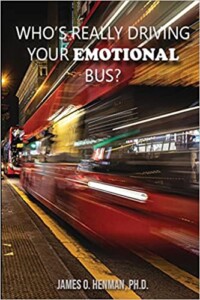Title: Who’s Really Driving Your Bus?
Author: James O. Henman, PhD
Publisher: Stonehenge Literary & Media
ISBN: 978-1088094167
Pages: 308
Genre: Self-Help
Reviewed by: Margie Przybylski
Pacific Book Review
Who’s Really Driving Your Bus? by James O. Henman, PhD, is a self-help book which provides readers with practical strategies to identify and overcome the underlying emotional issues that may be holding them back. Henman uses the metaphor of a bus to explain how our emotions can be driven by different parts of our psyche, and how we can take control of the driver’s seat to lead a more fulfilling life.
One of the key concepts in the book is the idea of “no-fault learning,” Henman’s theory to approach life with a non-judgmental attitude. This approach encourages readers to relax into making healthy changes in the present by avoiding the tendency to blame themselves or others for their emotional struggles. Instead, by recognizing everyone has the potential to make mistakes and learn from them, readers can develop a more compassionate and growth-oriented mindset.
Henman also highlights the importance of identifying and changing faulty perceptual filters, which are the lenses through which we see the world. These filters can be shaped by past experiences and can often distort our perception of reality, leading to negative emotions and behaviors. By recognizing and changing these filters, readers can gain a healthier perspective and a greater sense of personal power and awareness.
Throughout the book, Henman emphasizes the importance of developing core self-esteem, which he describes as a sense of self-worth that is based on internal strengths rather than external validation. He provides readers with tools and skills to empower their inner coach and shift from a survival mode into a more conscious and purposeful way of living.
Henman’s guide gives readers a toolbox of approaches to a calm life. Rather than being tossed from one stressful emotional experience to another – after reading Henman’s book, a reader should be equipped not only with stronger self-esteem but also with greater ability to forgive others and give them the benefit of the doubt. Rather than being fueled by negatively charged emotions, Henman’s readers become wise and calm – their lives ruled by what is most important to them.
The book is well-organized, with clear chapter headings and summaries which make it easy to navigate. Henman’s writing style is engaging and accessible, with plenty of real-life examples and practical exercises to help readers apply the concepts to their own lives.
Overall, Who’s Really Driving Your Bus? is an insightful and empowering guide to understanding and managing our emotions. It would be a valuable resource for anyone looking to improve their emotional well-being and live a more fulfilling life.


